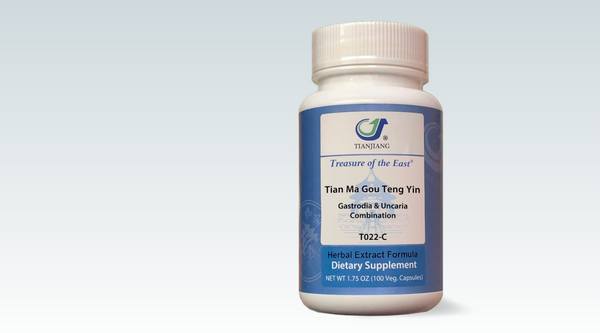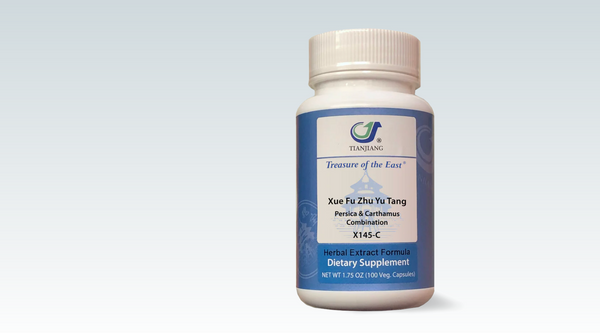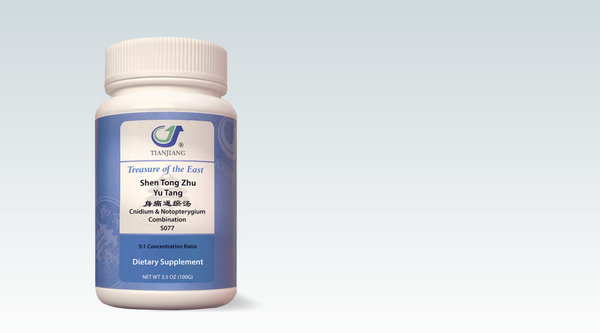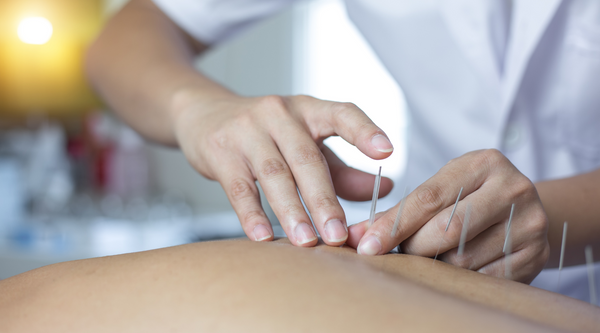6 Herbs used for Migraines & Migraine Self-Care Tips
According to the World Health Organization, migraines afflict approximately 10 to 12% of the global population, including children. In the United States alone, migraines afflict 12% of the population, making them the third most prevalent illness nationwide, as reported by Migraine Research Foundation.
What are the best herbs for migraines?
The following formulas are among the herbs often suggested for migraines: Chuan Xiong Cha Tiao San, Tian Ma Gou Teng Yin, Xue Fu Zhu Yu Tang, Shen Tong Zhu Yu Tang, Xiao Yao Wan (and its modification, Jia Wei Xiao Yao Wan), and Chai Hu Shu Gan Tang.
We’ll discuss these herbal formulations and the TCM theory behind both acute migraines, and migraine management and prevention. First, let’s discuss migraines and their common causes, along with a perspective from Chinese Medicine on migraines.
What is a migraine?
Migraines are characterized by pulsating headaches often presented with other symptoms like nausea, vomiting, and sensitivity to noise, light and smell.
According to Dr. Jason Sico, “We know migraines are caused by changes in the body and the brain chemistry and that genetics account for about half of all migraines.”

What is the difference between a headache and a migraine?
Headaches and migraines are both types of head pain, but they have distinct features.
A headache typically involves pain in any part of the head and can range from mild to severe, while a migraine is a chronic condition characterized by moderate to severe head pain, usually on one side, accompanied by other symptoms like nausea, light and sound sensitivity, and visual disturbances (aura).
Migraines, unlike general headaches, tend to occur in episodes and can be debilitating, significantly affecting an individual's quality of life.
What causes migraines, according to Western medicine?
Despite extensive research, the exact cause of migraines in Western medicine is not completely understood. It's believed that migraines are an outcome of temporary changes in the chemicals, nerves and blood vessels in the brain.
Biomedicine identifies genetics as an influential cause, and recognizes migraine triggers that include: stress, lack of food or sleep, exposure to specific environments or stimuli such as bright lights, certain foods or food additives, or hormonal changes (as experienced in menstrual migraines or pregnancy-related migraines).
How do Chinese herbs for migraines differ from prescription medications?
Chinese herbs and prescription medicines provide two different approaches for addressing migraines. Each method has its respective mechanisms of action, side effects, and overall philosophy, which can result in different therapeutic effects for different individuals.
Chinese Herbs used for Migraines
Chinese herbs rely on the principles of traditional Chinese medicine (TCM), which posits that health issues arise from imbalances in vital energy (Qi).
A common TCM pattern for migraines involves one or more of the following: Liver Qi Stagnation, Blood Stagnation, Liver Wind Stirring and Liver Fire Rising. Along with other natural approaches, such as acupuncture and diet and lifestyle modifications, Chinese herbs are used to restore balance and reduce frequency of migraines.
Side Effects of Herbs for Migraines
Chinese herbs are generally considered less likely to cause side effects. The most common include digestive discomfort, or an allergic reaction. These side effects can be mitigated or avoided altogether with a comprehensive intake by a qualified TCM practitioner.
Overall Philosophy
Chinese herbs for migraine emphasize on restoring the balance of Qi. It is a holistic approach where specific herbs are chosen based on individual conditions and migraines' causes.
Prescription Medications for Migraines
Prescription medicines generally focus on treating symptoms directly. They range from medications that stop symptoms that have already begun to others that prevent migraines from happening at all.
Side Effects of Medications for Migraines
The side effects of prescription medications can vary widely as many different types of drugs are used, such as triptans, ergots, opioids, and others. Side effects can include nausea, dry mouth, sleepiness, constipation, and the risk of medication-overuse headaches.
Overall Philosophy
Modern prescription medicines rely on a pathophysiological understanding of migraines and aim to target biochemical and functional changes in the brain to prevent or treat migraines.
The choice between Chinese herbs and prescription medicines often depends on numerous factors, including individual's health condition, the severity of migraines, and preferences for natural or western interventions. It's crucial to consult healthcare professionals or practitioners before deciding on a treatment approach.
6 Chinese Herbal Formulas for Supporting those with Migraines
Chinese medicine offers several formulas to address the different patterns of disharmony related to migraines. Additionally, maintenance formulas can offer a viable option for those seeking support with minimal side effects.
Herbs for Acute Migraine Attack
1. Chuan Xiong Cha Tiao San (Ligusticum Chuan Xiong Powder)
Chuan Xiong Cha Tiao San is the formula of choice for headaches and migraines caused by pathogenic wind. Wind is characterized as pain that moves, making this formula particularly suitable for head pain that is frontal, vertex and/or occipital. Vertigo or dizziness may also accompany this pattern of migraine.
Chuan Xiong is the primary herb in this formula, renowned for its ability to dispel wind and resolve painful stasis.
2. Tian Ma Gou Teng Yin (Gastrodia & Uncaria Combination)
Tian Ma Gou Teng Yin is often prescribed for patterns of Liver Yang Rising, in which migraines result from an imbalance caused by hyperactive Liver Yang. The prevalence of liver wind, yin deficiency and heat create excess qi that rises to the head. These migraines are often triggered by emotional distress or overwork.

Tian Ma Gou Teng Yin may also be used in cases of Liver Fire Blazing. This is when Heat or "Fire" in the liver can give rise to a migraine – typically related to strong emotional upset, particularly anger, frustration, or stress.
Tian Ma is a primary herb in this formula, and has used for centuries to address conditions like vertigo, seizures, and migraines.
3 & 4. Xue Fu Zhu Yu Tang (Persica & Carthamus Combination) and Shen Tong Zhu Yu Tang (Cnidium & Notopterygium Combination)
In Chinese medicine, when blood circulation to the head is disrupted, a pattern of Blood Stagnation can result in migraines. This can be caused by physical trauma, chronic illness, or emotional stress. Two formulations are often used in cases of migraines stemming from blood stasis:

Xue Fu Zhu Yu Tang, also known as the Drive out Stasis in the Mansion of Blood Decoction, is a traditional Chinese medicine formulation used to alleviate a variety of conditions, including migraines.
By unblocking qi and blood stasis, calming the Liver, nourishing the blood and opening the channels, Xue Fu Zhu Yu Tang is a powerful formula for addressing this pattern of migraines.

Shen Tong Zhu Yu Tang is another appropriate formula for migraines that stem from blood stasis. The herbs in this formula, such as Chuan Xiong, are believed to regulate blood flow and improve circulation, while alleviating the pain associated with migraines.
Migraine Herbs often used for Preventative Care
5. Xiao Yao Wan (Free & Easy Wanderer) and Jia Wei Xiao Yao San (Free & Easy Wanderer Plus)
For those with an underlying pattern of Qi and Blood Deficiency with Liver Qi Stagnation, emotional upset or stress can easily “tip the scales” into Liver Yang Rising.
For this reason, two formulas are often recommended for migraine preventative care, meaning they can be taken over the long-term to support the body’s qi, nourish blood and smooth the liver qi.
Xiao Yao Wan is an excellent migraine supportive care formula, with Liver-smoothing herbs like Chai Hu; while Jia Wei Xiao Yao San provides supplemental cooling properties with addition of herbs such as Mu Dan Pi.
6. Chai Hu Shu Gan Tang (Bupleurum Spreading Powder)
Chai Hu Shu Gan Tang offers even more Liver-smoothing capabilities over Xiao Yao San. Chai Hu acts as the principle herb in this formula, to maintain healthy emotional flow.
For migraines that stem from stress or emotional imbalances and do not include a Blood deficiency component, Chai Hu Shu Gan Tang may be a suitable option.
Herbs for Migraines: A Note on Individual Herbs
Often times, a practitioner will recommend a preventative care formula for migraines, while modifying that formula to be used for acute migraine attacks.
In such cases, two herbs may be added: Bai Zhi and Ju Hua.
Bai Zhi acts to relieve painful stasis and move blood, while Ju Hua (Chrysanthemum flower) calms the liver and dispels wind. Together, these two herbs for migraines can be added to an existing formula and be used as needed.
Lifestyle Tips for Migraine Prevention – Inspired by Chinese Medicine
Migraines can be debilitating, but there are several strategies and lifestyle changes inspired by Traditional Chinese Medicine that you can consider:
- Diet and Nutrition
TCM recommends consuming a balanced, nutritious diet.
What to include: TCM emphasizes on warm and nourishing foods like whole grains, cooked vegetables, and protein-rich foods.
What to avoid: It advises against consuming cold, raw foods, and processed items such as excessive sugar, dairy, or unhealthy fats. Certain foods are known to trigger migraines - alcohol, aged cheeses, caffeine, chocolate, artificial sweeteners, and preservatives such as nitrates, nitrites, or MSG are typical culprits.
- Regular Exercise
Regular physical activity encourages better blood circulation which is integral to migraine prevention, according to TCM.
What to do: Consider activities like qigong, tai chi, swimming, walking, or yoga.
- Good Sleep Habits
Ensuring a regular sleep schedule can also prevent migraines.
What to do: Try to go to bed and wake up at the same time each day, making sure you get enough rest.
- Stress Management
Stress is often a common trigger for migraines.
What to do: TCM supports strategies like mindfulness, meditation, and deep breathing exercises to manage stress levels. Acupuncture or acupressure can also be a useful tool for stress reduction.
- Adequate Hydration
Dehydration can also trigger migraines.
What to do: Ensure you are consuming enough water each day.

- Acupuncture and Herbal Medicine
TCM often recommends a combination of acupuncture and herbal medicine to prevent migraines.
What to do: Consult a TCM practitioner who can suggest a regimen tailored to your body's requirements.
Conclusion
We hope you’ve learned how Chinese medicine is used to help in the management and prevention of migraines.
We recommend seeking guidance from a qualified practitioner of Traditional Chinese Medicine who can recommend a holistic care plan for migraines that includes herbal medicine and other natural therapies.
Our wish is to empower TCM practitioners and their patients with premium-level Chinese herbs for managing and preventing migraines – safely and naturally.
Practitioners, did you know...? Treasure of the East’s full-spectrum extracts contain the same active chemical constituents as raw herbs! Register for a professional account today, or read on to discover all the benefits of including full-spectrum granules in your herbal pharmacy.
This article is provided only as an educational resource - it is not intended or implied to be a substitute for professional medical advice, and the herbs and/or formulas within are not intended to diagnose, treat, cure or prevent any diseases. This information is intended for only licensed healthcare practitioners.



















